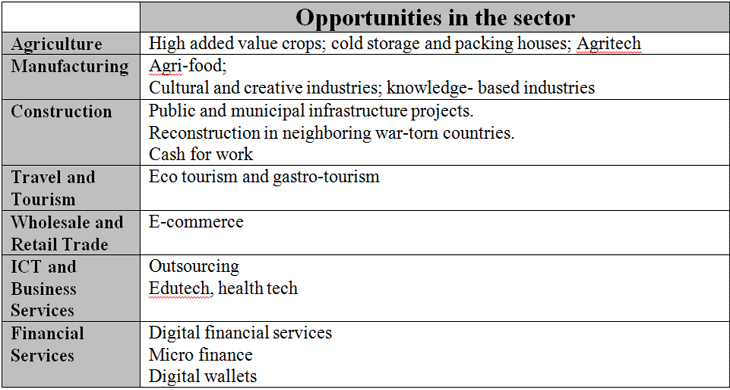Agri-food offers
high potential for youth
Promising job prospects in e-commerce and trade digitization
| Share |
|

|
|

|
|
|
|
Wholesale and retail trade, agri-food processing, cultural and creative industries, information and communication technologies (ICT), business professional services, and travel and tourism are priority sectors to support youth job creation, according to ‘Transforming Challenges into Opportunities for the Youth’, a recent report by the United Nations Development Programme (UNDP).
These sectors have shown better resilience to the crisis and provide economic opportunities with high growth potential for the youth.
Around half of the surveyed entrepreneurs, aged 18 to 40 years, agree that growth sectors are concentrated in two main industries: agri-food processing (47 percent) – such as mouneh - and the recycling and upcycling industry (46 percent).
“Given the infrastructural setbacks, such as electricity shortage and internet connectivity cuts, 41 percent of surveyed participants believed that renewable energy (like solar and wind energy) will witness sector growth. On point with the global trend of digital transformation, founders predict that digital media (39 percent) and software development and ICT services (36 percent) will serve as further opportunities for growth,” the report said.

Source: UNDP
Agri-food processing sector is the top exporting sector (its exports reached $546 million in 2021) and the largest employer in the manufacturing sector (around 20,000 employees). Its ability to export and expand into overseas markets had enabled it to record a slower decline in its performance compared to other manufacturing sub-sectors.
Wholesale and retail trade, while considered a low productivity sector that employs mainly low-skilled youth, is one of the largest employers of youth (19 to 20 percent of youth employment). “One of the most important trends in the sector is the digitization of trade services and the flourishing of e-commerce after the pandemic. This can be capitalized on to move to higher value creation and better job prospects,” the UNDP said.
According to the report, most of agriculture products have gained comparative advantage in international markets in the last three years due to reduced costs in terms of real dollars including labor and cost of local services and import taxes on agriculture inputs such as seeds and equipment. “However, this advantage is diminishing as the government starts to adopt a new exchange rate to collect customs and other taxes, and the economy becomes fully dollarized - including salaries. Therefore, the focus on high-value added crops remains the most viable option to export Lebanese agriculture products, as Lebanon cannot compete on economies of scale and volumes, but rather must compete on quality,” the UNDP said. Top exported crops that have comparative advantage and that have been prioritized by international organizations for support include apricots, table grapes, apples, oranges, and bananas.
“Post-harvest facilities including sorting, packaging, cooling and processing are another investment opportunity that are attracting investors as the sector becomes more export-oriented and moves towards a more sophisticated supply chain that meets the demand of international markets,” the paper said.
Date Posted: Nov 01, 2023
| Share |
|

|
|

|
|
|
|